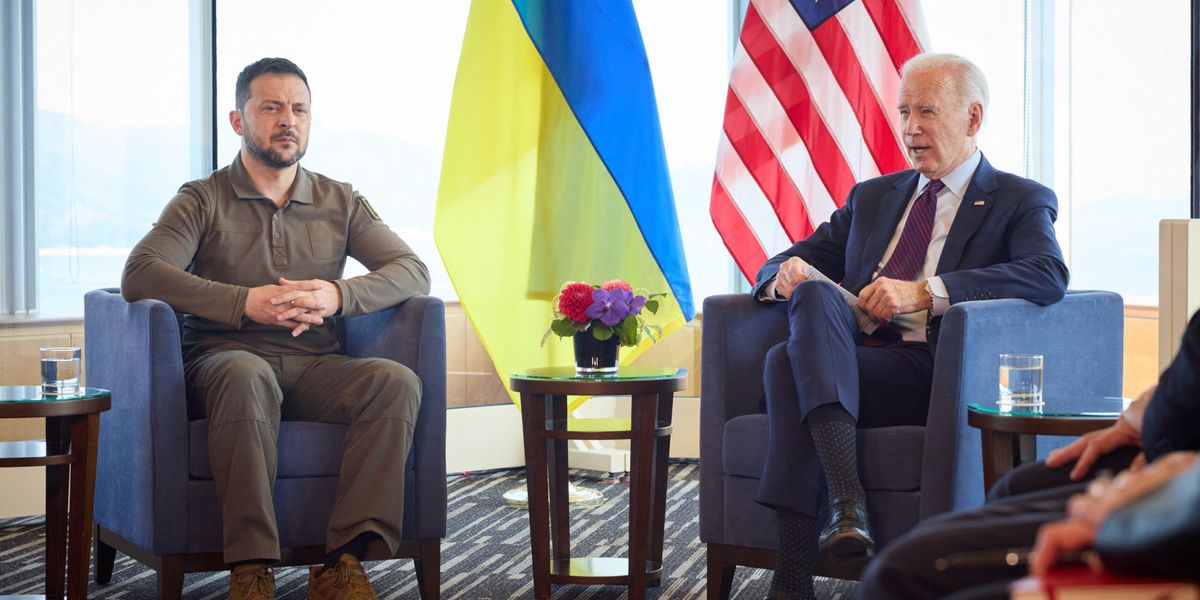Roughly 70% of Americans want the Biden administration to push Ukraine toward a negotiated peace with Russia as soon as possible, according to a new survey from the Harris Poll and the Quincy Institute, which publishes Responsible Statecraft.
Support for negotiations remained high when respondents were told such a move would include compromises by all parties, with two out of three respondents saying the U.S. should still pursue talks despite potential downsides. The survey shows a nine-point jump from a poll in late 2022 that surveyed likely voters. In that poll, 57% of respondents said they backed talks that would involve compromises.
The new data suggests that U.S. government policy toward the Ukraine war is increasingly out of step with public opinion on the eve of the second anniversary of Russia’s full-scale invasion.
“Americans’ strong support for U.S. diplomatic efforts to end Russia’s invasion of Ukraine stands in stark contrast to Washington’s reluctance to use its considerable leverage to get Kyiv and Moscow to the negotiating table and end this war,” said George Beebe, the director of grand strategy at the Quincy Institute.
The Biden administration has publicly rejected the idea of negotiating an end to the war with Russia, with U.S. officials saying that they are prepared to back Ukraine “as long as it takes” to achieve the country’s goal of ejecting Russian troops from all of its territory, including Crimea.
Just this week, Russian sources told Reuters that the U.S. declined a Kremlin offer to pursue a ceasefire along the current frontlines in conversations held in late 2023 and early 2024, including a round of unofficial talks in Turkey.
U.S. officials denied the claim, saying there was no “official contact” between Moscow and Washington on the issue and that the U.S. would only agree to negotiations involving Ukraine. Reuters’ Russian sources claimed that American officials said they did not want to pressure Kyiv into talks.
The Harris/Quincy Institute poll involved an online survey of 2,090 American adults from Feb. 8 to 12. The results are weighted to ensure a representative sample of the U.S. population. The margin of error is 2.5% using a 95% confidence level.
As the House weighs whether to approve new aid for Ukraine, 48% of respondents said they support new funding as long as it is conditioned on progress toward a diplomatic solution to the war. Others disagreed over whether the U.S. should halt all aid (30%) or continue funding without specific conditions (22%).
This question revealed a sharp partisan divide on whether to continue Ukraine funding in any form. Fully 46% of Republicans favor an immediate shutoff of the aid spigot, as compared to 17% of Democrats.
Meanwhile, 54% of Democrats and 40% of Republicans favored conditioning aid on diplomatic talks. “The American people seem more clear-eyed than Washington in recognizing the urgent need to pair aid for Ukraine’s defense with a diplomatic offensive,” Beebe argued.
The poll also showed that most Americans expect the war to drag into at least 2025. Only 16% of respondents thought the war would end this year. Others were evenly split on how long the war might last, with 46% expecting it to be resolved before the end of 2026 and 38% saying there is no end in sight.
- Ukraine facing increasingly unfavorable odds ›
- Biden's role in Ukraine peace is clear now ›
- The Ukraine War at 2 years: By the numbers | Responsible Statecraft ›
- Poll: Europeans increasingly pessimistic about Ukraine war | Responsible Statecraft ›
- Diplomacy Watch: Russia could be invited to Ukraine-led peace talks | Responsible Statecraft ›
- A chat with the devil beats a lifetime in hell | Responsible Statecraft ›
- Diplomacy Watch: Ukrainian public opinion more divided than ever | Responsible Statecraft ›
- Poll: Most Americans don't want to send troops to defend Israel | Responsible Statecraft ›
- American Sentiment for Interventionism Fading | Responsible Statecraft ›















